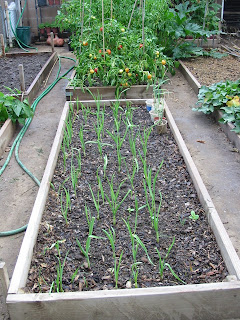Here's some peppers, pineapple guavas, green beans, and the last of the eggplants
First crop of Sun-chokes, pretty good sizes, and still a LOT more from where these came from. We found a good way to eat them. We've pickled them. They don't develop the strong smells that we were not fond of when cooked. Plus we applied shaved bonito flakes, salted, minced perilla (shiso) and ground sesame very generously. It's crispy and refreshing! They say it's very good for diabetics because it contains inulin, which helps regulate insulin levels.
More Peppers
Even More Peppers!
We're nearing our end in Pepper production. We were VERY pleased with the plants this year, and thankfully NO Pepper Weevils!
We have started seed on Broccoli, Cabbages, Lettuces, Celery, Daikon and Napa Cabbages in pots while we let the soil rest a bit between the summer and winter plantings. We have started a new method of composting. Instead of stuffing our compost bins with the veggie garden's end of season plants, we're chopping them up, taking out a few inches of soil from the bed, then placing the chopped vegetation there in the bed directly, then burying what was grown in that bed (as long as it's not diseased). The idea is: that that plant, be it tomato or beans, grew using the soil's nutrients and the sun's energy to grow, so returning it to rest right THERE makes the most sense. All the nutrients minus the fruits of the plants are are basically returned, in addition to new energy made by photosynthesis. There are other methods, like cutting the plant at the base and simply laying the old plant on the soil, but for us, that method takes too long for decomposition.
We are blessed with a very long growing season, so we don't let our soil rest as long as those who have snow cover. So far, as long as we add nutrients back into the raised beds from our compost and through our till under method and a bit of rock dust, we get great results with happy plants! We are in zone 9 with 120-150 days with heat about 86 F. We get frost about 3~4 weeks out of the year, so growing winter hardy crops, we can be growing year round. Carrots, Beets and Daikon actually store more sugars in their roots when there are colder temps. Cabbages can withstand some frost, and peas cant withstand quite a lot of it. I know we're spoiled here with all the warm weather... I just wish we had more rain! (the grass is always greener...)
























